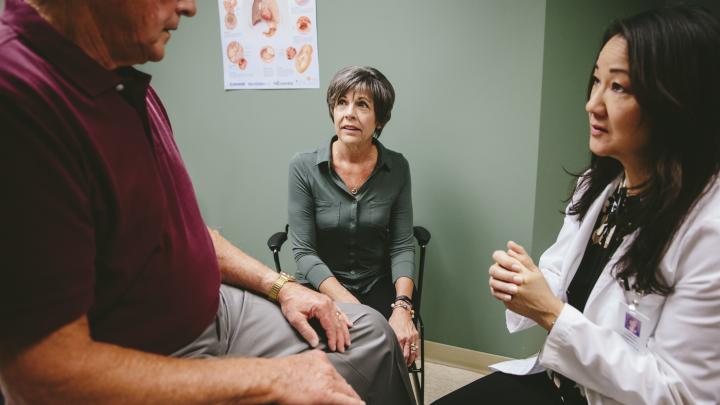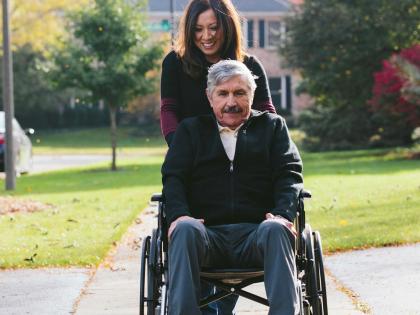
Reduce Health Care Barriers and Increase Access to Residential and Home and Community-Based Services
The costs of health care and long-term care for individuals living with Alzheimer’s or other dementia are massive, with dementia being one of the costliest conditions to society. With Medicare not covering long-term care, few individuals living with dementia have sufficient resources to cover the cost of their care. State policymakers can take action by:
- Increasing Medicaid reimbursement rates for residential settings and home and community-based services (HCBS) that serve the unique needs of individuals living with dementia.
- Expanding Medicaid financial eligibility standards for HCBS and long-term care services.
- Adjusting Medicaid eligibility requirements for HCBS and long-term care services to consider the needs related to cognition, such as activities of daily living.
- Providing Medicaid coverage and other state funded coverage for dementia-competent HCBS, including: personal care, respite care, care coordination, adult daycare, assisted living, medication management, chore and/or companion care and personal emergency response services.
Ensure state Medicaid programs provide appropriate coverage for Food and Drug Administration (FDA)-approved treatments for Alzheimer’s
Alzheimer’s and other dementia pose significant challenges and costs to families and the health care system. As research continues, FDA-approved treatments may benefit individuals and reduce health care expenditures. State policymakers can take action by:
- Ensuring Medicaid coverage of treatments is aligned with the clinical standards established by the FDA for all approved treatments for Alzheimer’s.
Create and implement a statewide crisis response system to support the unique needs of individuals living with dementia

People living with Alzheimer’s and other dementia have unique needs that often make care delivery and communication more challenging. Without proper training to recognize the signs and effectively communicate with people living with dementia, situations may escalate quickly with potentially dangerous consequences. State policymakers can take action by:
- Requiring dementia-specific training for all first responders including law enforcement, fire, and emergency medical technicians.
- Requiring dementia-specific training for Adult Protective Services, Long-Term Care Ombudsmen and Medicaid functional screening staff.
- Establishing statewide measures such as pre-crisis plans, mobile crisis units, dementia behavioral specialists, dementia-specific crisis stabilization units, and post-crisis follow-up care.
Strengthen the health care workforce for all levels of dementia care
As the prevalence of Alzheimer’s disease increases, so does the need for additional members of the workforce who are involved in diagnosing, treating and caring for those living with the disease. The demand for direct care workers (roles such as nurses aides and home health aides) is projected to grow by more than 40% between 2016 and 2026, while their availability is expected to decline. State policymakers can take action by:
- Creating career pathways and secure financial incentives, including loan forgiveness programs and grant programs, to recruit and retain direct care workers with a focus on dementia.
- Requiring compensation and benefits for direct care workers that is competitive, based on data from other employment opportunities available.
- Securing financial incentives to recruit health care providers with geriatric, neurological, and dementia-specific training.
- Ensuring the needs of individuals living with dementia are addressed in policy initiatives that create or direct a workforce commission, council, taskforce, workgroup or study.
- Establishing a workgroup for cross-sector collaboration that connects state agencies with employers and training programs to identify priorities and coordinate direct care workforce development solutions.
Establish or strengthen programs that provide support to family dementia caregivers

Eighty-three percent of the help provided to older adults in the United States comes from family members, friends or other unpaid caregivers. Alzheimer's takes a devastating toll on these caregivers. Compared with caregivers of people without dementia, twice as many caregivers of those with dementia indicate substantial emotional, financial and physical difficulties. State policymakers can take action by:
- Funding Alzheimer’s-specific respite programs and ensuring the criteria is inclusive.
- Funding evidence-based or evidence-informed programs that support family dementia caregivers through education and counseling.
- Establishing a statewide program to deploy dementia-specific counselors within existing aging and disability information hubs such as Area Agencies on Aging or Aging and Disability Resource Centers.
- Including individuals living with dementia who receive Medicaid HCBS in spousal impoverishment protections.
Resources to Drive Change in Your State
The following resources will help you learn more about how you can help increase access to dementia care, support and treatment in your state.
Alzheimer’s Policy in the States
Across the nation AIM advocates are working to advance public policies to improve the lives of individuals and families impacted by Alzheimer’s and all other dementia. Learn about Alzheimer’s policies and advocacy in your state.